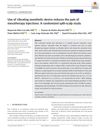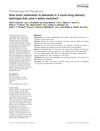TLDR Scalp microinfusion is a new method for treating hair loss that shows promise but needs more research for standardization.
Scalp microinfusion, also known as the MMP® technique, is a novel drug delivery method for hair loss treatment that uses micro-needling to infuse drugs into the skin. The technique has been used successfully in treating androgenetic alopecia and alopecia areata, and it is well tolerated by most patients. The procedure involves uniform injections of small amounts of drugs into the dermis, which can stimulate hair growth and activate hair growth-related genes. However, the technique lacks standardization regarding the number of sessions needed, the optimal interval between sessions, the maintenance protocol, and the ideal blend of drugs to be infused. Further studies are needed to establish the efficacy of this technique and develop standardized protocols.
June 2022 in “Journal of Cosmetic Dermatology” Minimally invasive procedures may help with female hair loss but need more research and should be done by experts.
 5 citations
,
July 2020 in “Journal of Cosmetic Dermatology”
5 citations
,
July 2020 in “Journal of Cosmetic Dermatology” A vibrating anesthetic device significantly reduces pain during mesotherapy for hair loss without complications.
34 citations
,
January 2020 in “Expert opinion on drug delivery” New methods like microneedling and nanoparticles can improve hair loss treatments.
 19 citations
,
March 2019 in “International Journal of Dermatology”
19 citations
,
March 2019 in “International Journal of Dermatology” The tattoo machine method safely delivers an average of 1,175 µg/cm² of medication into the skin.
 1 citations
,
August 2022 in “JAAD case reports”
1 citations
,
August 2022 in “JAAD case reports” Tofacitinib and oral minoxidil may help treat Sisaipho alopecia areata.
 April 2022 in “Journal of Cosmetic Dermatology”
April 2022 in “Journal of Cosmetic Dermatology” Trimax-360 Serum, when used for 98 days, safely and effectively improves hair growth, thickness, and density without any side effects.
 5 citations
,
January 2020 in “Journal of Dermatology”
5 citations
,
January 2020 in “Journal of Dermatology” Temporal hair loss relates to overall scalp hair loss in women.

Some treatments like minoxidil, finasteride, and surgery can help with hereditary hair loss.
 41 citations
,
December 2008 in “International Journal of Dermatology”
41 citations
,
December 2008 in “International Journal of Dermatology” South Korean women with hair loss have lower hair density and thickness compared to healthy women.
 370 citations
,
September 1999 in “The New England Journal of Medicine”
370 citations
,
September 1999 in “The New England Journal of Medicine” Finasteride and minoxidil are effective for hair loss, but continued research is needed for better treatments.








